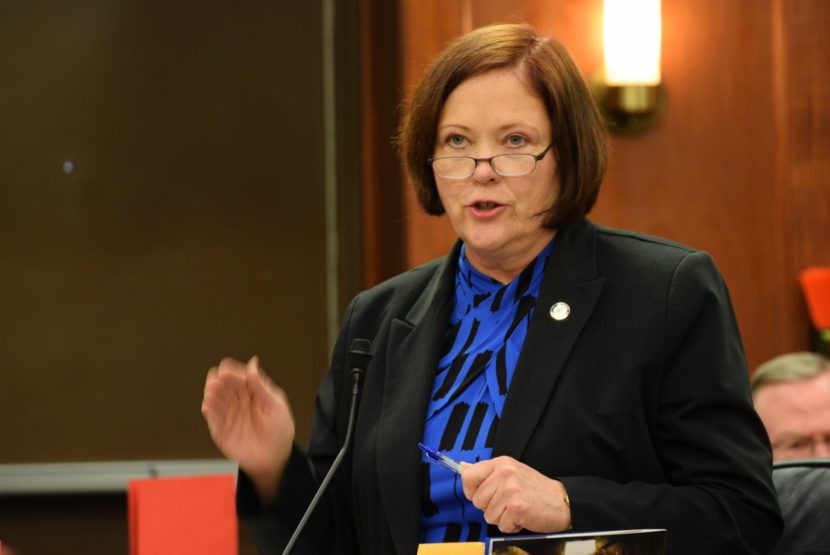
Senate Minority Leader Berta Gardner introduced legislation yesterday to create a permanent Ways and Means Committee in the Senate. It’s a companion to a bill introduced by Rep. Sam Kito, a Democrat from Juneau, in the House earlier this week.
I spoke with Gardner as part of a series of conversations with legislative leaders this week. She said the committee would provide a forum where legislators can understand the costs and the benefits of any proposal to address the budget deficit.
GARDNER:Whether they’re new revenue, taxes or cuts, because I think a lot of us lack the information to really make informed votes. And the Finance Committee, where normally this kind of discussion goes, is already overwhelmed. I mean, almost every bill goes through there, and things get bottlenecked and it also — the finance committees are not a forum for all legislators to participate. And we would like to broaden that discussion so that the Ways and Means Committee could focus exclusively on new revenue and cuts, and more people can be actively engaged and asking questions and studying the issues.
TOWNSEND: Well, lawmakers have a lot of work this session in a short amount of time. Is there any concern that adding the committee might make the process more cumbersome?
GARDNER: Well not necessarily because our primary obligation in this session clearly is this issue, and if it means we can’t get to other things in other committees, well, so be it. There is nothing more important, more urgent, in this unprecedented situation in which we find ourselves. We hear people comparing it to what happened in the ’80s. It’s nothing like the ’80s. In the ’80s, all that oil was still in the ground and access to it was right on the horizon. That’s not the case now. It’s a deep, deep, hole and the best we can do in terms of new revenue from our resources is a drop in the bucket, if you’ll pardon that expression, compared to what we need in a three-and-a-half or $4 billion hole that we’re in.
TOWNSEND: Last year’s session was contentious. Are you hopeful that Democrats, Republicans and the governor can have a better working relationship this year?
GARDNER: I am. I think everybody last year learned a lot. The majority of Republicans on the House side, I think, were particularly in a tough place because they weren’t used to having to negotiate with the minority and kinda didn’t know how. We have a new governor who was getting his feet under him, and he had very little history in this building. So things have been a little awkward and inefficient, and people stepped on each others’ toes at times and I don’t think there was any malice or anything intended. But things, you know, we’re all learning how to deal with each other and work with each other.
Beyond that, I am greatly bolstered by the way the special session in October went, and I’ve been through a lot of special sessions, and that is the first time I felt that people came down not locked into place. I mean, it was a really good process and people came together, and in the end it was overwhelming support. So I like that, and it shows me that we can work together and let go of things when we want to, or need to or see a good reason to. And there’s never a better reason than what we’re looking at right now.
TOWNSEND: Will you support tapping the Permanent Fund earnings?
GARDNER: I don’t want to say that I would never do that, but everything has to be part of a package. Under what conditions? You know, this’ll be a discussion that we all have to have. And I understand, according to the Rasmuson Foundation poll, there is broad support for doing that in the public, but doing that to what end? Do we have a sustainable thing? Once we start getting into using the fund itself, it’s almost like a license to keep going, and we have to make other hard decisions.
TOWNSEND: Are there taxes that you would support or could support?
GARDNER: I think that, in the end, if we manage to get to a sustainable plan, we will all be elated and no one will be really happy. And that’s true for all of us, and it’s just gonna be a long process. I think we need to be talking with each other and willing to listen and willing to consider what other people want to.
